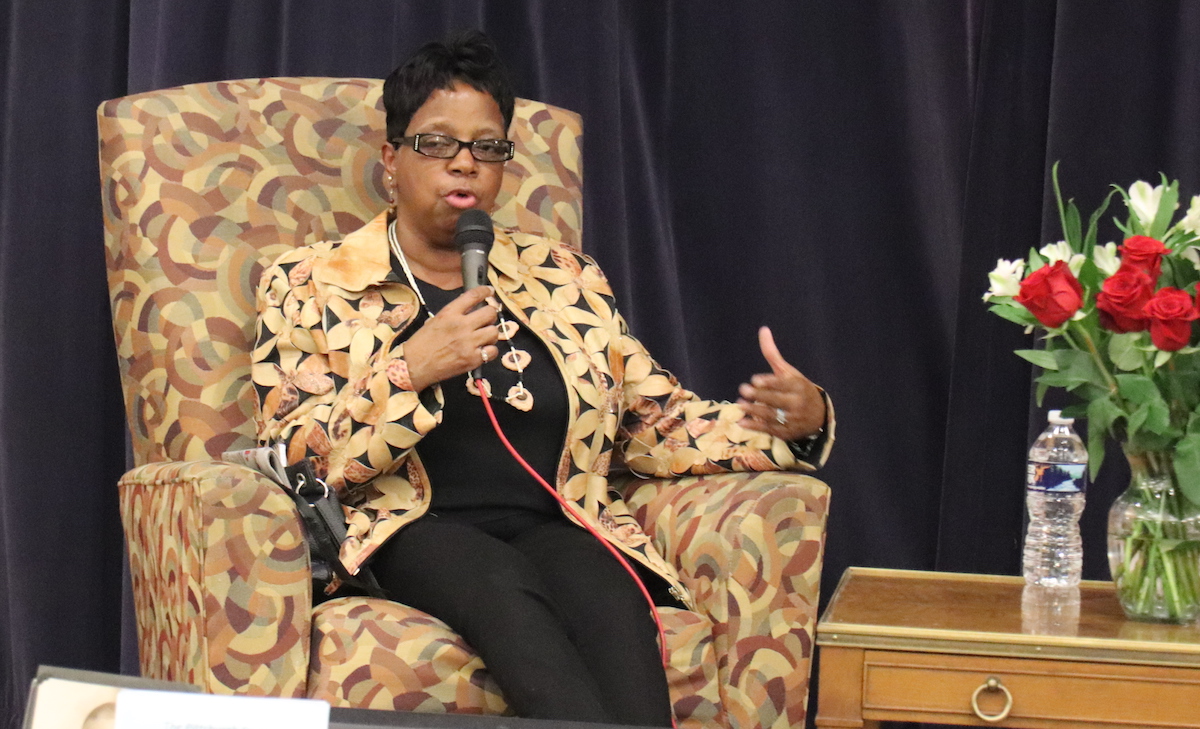(Advertisement)
Tube City Community Media Inc. is seeking freelance writers to help cover city council, news and feature stories in McKeesport, Duquesne, White Oak and the neighboring communities. High school and college students seeking work experience are encouraged to apply; we are willing to work with students who need credit toward class assignments. Please send cover letter, resume, two writing samples and the name of a reference (an employer, supervisor, teacher, etc. -- not a relative) to tubecitytiger@gmail.com.
Ads start at $1 per day, minimum seven days.
City Native Recalls Glory Days of Pittsburgh Courier
Daniels was first Black reporter at McKeesport’s Daily News
By Ann Belser
The Tube City Almanac
March 24, 2020
Posted in: McKeesport and Region News

(Photo by Ann Belser for East End Print)
Diane I. Daniels had always wanted to work for the Pittsburgh Courier.
It was the paper that changed the civil rights conversation: an African American newspaper that was so controversial, that in the 1920s and 1930s, Pullman porters would hide it in the train and then deliver it to specific ministers down south so that segregationists would not seize the copies and burn them.
All of the great Black intellectuals had written for the Courier in its heyday.
Daniels, a McKeesport native who is now a freelance business writer for the New Pittsburgh Courier, spoke about her experience trying to get a job at the New Pittsburgh Courier following a screening of the 2009 documentary “Newspaper of Record: The Pittsburgh Courier 1907-1965.”
She was on a panel discussion at the Homewood Branch of the Carnegie Library of Pittsburgh on Feb. 26. The event was presented by the Friends of the Homewood Library.
At its height in the middle of the 20th century, the Pittsburgh Courier had more than 350,000 subscribers across the country.
Daniels had always wanted a job there. “I am a civil rights baby. I was born in the ’50s, so in the ’50s and the ’60s as I was growing up I always remember reading the Courier and seeing those pictures (of the civil rights movement) they showed on the TV,” she said.
The newspaper, which once printed 14 different weekly editions that were distributed across the country, took on lynching, voting rights, segregation and the Ku Klux Klan, speaking out on the biggest issues of the era.
In World War II, when the American Red Cross refused to accept blood for the troops from Black donors, the Courier called them out. When the organization changed its policy — but then refused to give blood from Black donors to white soldiers — the Courier called them out again, and the Red Cross backed down from its racism.
And when soldiers who were fighting for freedom overseas were battling racism at home, the Pittsburgh Courier promoted its “Double V” campaign — symbolizing “victory” overseas and “civil rights victory” at home.
There were two Black newspapers with strong national readership at the time, the Courier and the Chicago Defender, said Cody McDevitt, a historian.
“That’s something in which we can take some regional pride,” said McDevitt, who spoke Feb. 29 at the Afro-American Historical & Genealogical Society of Pittsburgh about his book, “Banished from Johnstown: Racist Backlash in Pennsylvania.”
The Courier was the only major news source to document the story of two weeks in 1923 when more than 2,000 African Americans and Mexicans were forced out of Johnstown, Cambria County, by men with guns who threatened to throw them in prison if they did not leave.
Daniels was well aware of the importance of the Courier. Every Wednesday and Saturday, when she was in college at Wilberforce University in Ohio, she would go to the library to read what was happening at home.
During her college years, Daniels said, she applied for internships at the Courier, and was turned down, but wound up writing for other newspapers in Ohio.
When she graduated, she came home and applied to both the McKeesport Daily News and the New Pittsburgh Courier, which was her dream job.
The Daily News had never had a Black reporter. Retired Supreme Court Justice Cynthia Baldwin, who was at that time an attorney but was also Daniels’ Sunday school teacher, lobbied the paper to give her a job.
Daniels got the job at the Daily News. The same day she received an offer from the New Pittsburgh Courier.
“I had to turn down my dream job,” she said. Instead, she wrote for the Daily News as the first Black reporter there.
Today, Daniels profiles Black-owned businesses for the Courier while running her own public relations firm.
The original Pittsburgh Courier filed for bankruptcy in 1965, and in 1966, a new Black newspaper, the New Pittsburgh Courier, was founded. It maintains the name and its predecessor’s crusading spirit.
For the last 10 years, the New Pittsburgh Courier has every month unflinchingly documented homicides in the Black community in Allegheny County. It covered the deaths at the hands of police of both Black businessman Jonny Gammage in the 1990s and Black teen-ager Antwon Rose II in 2018.
Most recently, the Courier has followed the story of Allegheny County Common Pleas Judge Mark Tranquilli, who was accused of making racist remarks about Black jurors and people appearing in his courtroom.
Ann Belser is editor and publisher of Print, a weekly newspaper based in Pittsburgh’s East End, where this article first appeared. She may be reached at annb@eastendprint.com.
Originally published March 24, 2020.
In other news:
"Port Authority Reduci…" || "Mayor: Duquesne Counc…"
 TM
TM